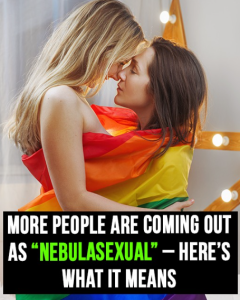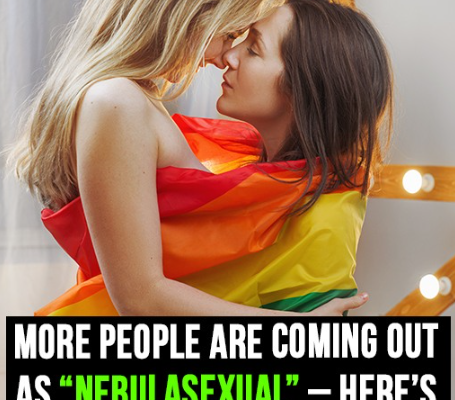
People Are Now Coming Out as ‘Nebulasexual’
In a world where human identity keeps expanding, new words continue to surface that help people describe the complex ways they experience love, attraction, and connection. One of the newest additions to that growing vocabulary is “Nebulasexual.” The term has sparked both curiosity and debate, as more individuals are now publicly identifying with it and sharing their experiences online.
At first glance, the word might sound like science fiction — something out of a galaxy far, far away. But “nebula,” the root word, comes from Latin and means cloud or mist. It perfectly captures the essence of what people who identify as Nebulasexual describe: a hazy, uncertain, or cloudy experience of sexual attraction that is difficult to define or label in conventional terms.
Understanding Nebulasexuality
People who identify as Nebulasexual often say they have trouble determining whether they actually feel sexual attraction at all. It’s not that they’re indifferent or cold; it’s that their sense of attraction feels confusing or blurred. They might feel drawn to people but can’t clearly identify if that attraction is romantic, aesthetic, or sexual.
Many individuals who resonate with this term are neurodivergent — meaning they think and process emotions differently due to conditions like autism, ADHD, or OCD. These neurological variations can make it harder for them to interpret internal feelings or separate genuine attraction from intrusive thoughts or patterns.
One widely shared definition describes Nebulasexual as:
“Someone who cannot tell if they experience sexual attraction or not, often due to neurodivergence or intrusive thoughts.”
For these individuals, attraction doesn’t come with the same clarity that most people take for granted. They might enjoy intimacy or desire relationships but still struggle to define what that attraction means on a deeper level.
How the Term Emerged
The rise of Nebulasexuality fits within a broader cultural moment where people are exploring and naming experiences that traditional categories have long overlooked. Over the past decade, the language of identity has expanded dramatically — from gender identities like nonbinary and agender to orientations like demisexual, greysexual, and now Nebulasexual.
Online spaces like Tumblr, Reddit, and TikTok have played major roles in spreading these terms. On forums, neurodivergent users began describing how confusing attraction felt for them — not because they were indecisive, but because their brains simply didn’t process those feelings in typical ways. Someone coined “Nebulasexual” as a metaphor for that foggy uncertainty, and the word resonated.
Soon, people began creating pride flags, communities, and discussion threads around it. The flag often features cloudy gradients of purple, blue, and gray — symbolizing confusion, space, and the spectrum of experience.
Why It Matters
Labels like Nebulasexual are not about complicating things; they’re about finding clarity within complexity. For many who use the term, it’s not just a trendy identity — it’s a tool for self-understanding.
People who identify this way often say the term has given them peace. Instead of feeling broken or “confused,” they now have a word that validates their experience. It acknowledges that attraction can feel foggy and undefined, and that’s okay.
One online commenter shared, “I used to think I was just bad at understanding my emotions. But then I found the term Nebulasexual, and it finally clicked — I’m not broken. My brain just experiences attraction differently.”
For neurodivergent individuals especially, this recognition can be deeply affirming. They often grow up feeling like outsiders in social and romantic contexts. Having a label like Nebulasexual can bridge the gap between self-doubt and self-acceptance.
How It Differs from Other Orientations
Some people confuse Nebulasexuality with asexuality, but there’s a distinction. Asexual individuals don’t experience sexual attraction or feel it rarely. Nebulasexual individuals, on the other hand, often feel something — they just can’t tell exactly what that something is. It’s attraction wrapped in mist.
It can also overlap with other orientations. Someone might identify as both Nebulasexual and Demisexual (feeling attraction only after emotional connection) or Nebulasexual and Greysexual (experiencing attraction occasionally). Because the concept centers on uncertainty, it’s flexible and personal.
Another similar term is Quoisexual — meaning someone who doesn’t understand or can’t define sexual attraction. The difference is that Nebulasexual tends to emphasize the neurodivergent experience and the influence of mental patterns, while Quoisexual can apply to anyone.
Why It’s Trending Now
In 2025, the digital world has amplified every corner of identity exploration. Short videos, podcasts, and online zines share new terms at lightning speed. When the phrase “People Are Coming Out as Nebulasexual” began trending, it caught people’s attention for its mysterious sound — but the discussions that followed revealed how relatable it actually was for many.
The term resonates particularly with younger generations who grew up surrounded by inclusive language. For Gen Z and Gen Alpha, labels are less about boxes and more about communication tools — ways to describe inner experiences that used to go unspoken.
Mental health awareness has also played a role. As conversations about neurodivergence, trauma, and identity become more open, more people are reflecting on how their mental wiring affects emotional and sexual experiences. Nebulasexuality gives a name to that intersection.
Controversy and Criticism
As with any emerging identity, Nebulasexuality hasn’t escaped skepticism. Some critics argue that it overcomplicates human sexuality, while others worry that it blurs the line between medical and identity language.
Supporters counter that the purpose of micro-labels isn’t to divide but to describe. In a world where people’s brains function in countless unique ways, it makes sense that attraction would too. No one is forced to use the term — it simply exists as an option for those who find comfort in it.
Another debate centers on whether Nebulasexual should be reserved for neurodivergent individuals. Some advocates insist it should, since its definition is rooted in neurological difference, while others see it as open to anyone who experiences similar confusion about attraction.
Ultimately, as with many identities, its meaning is shaped by the people who use it. Language evolves, and so do the ways we describe ourselves.
The Broader Message
Beyond the label itself, Nebulasexuality highlights something profound: human sexuality isn’t binary, linear, or always clear. Attraction can be fluid, layered, and shaped by the mind as much as by the body.
For those who identify as Nebulasexual, the term serves as a gentle reminder that uncertainty doesn’t mean absence. You don’t have to have all the answers about your attraction to know it’s valid. In a culture that demands labels and clarity, embracing the unknown can actually be freeing.
Conclusion
The rise of Nebulasexuality shows how language continues to evolve alongside our understanding of the human mind. It reminds us that the way we experience attraction is as vast and mysterious as the galaxies themselves. Some people might see labels like this as unnecessary — but for others, they are lifelines, helping turn confusion into comprehension.
As more people come forward to say “I think I might be Nebulasexual,” the message isn’t about division. It’s about self-recognition and compassion. It’s about finding peace in the fog.
Because sometimes, identity isn’t a straight line — it’s a nebula.
#Hashtags
#Nebulasexual #NewSexuality #LGBTQCommunity #NeurodivergentVoices #IdentityAwareness #HumanSexuality #Pride2025 #QueerIdentity #Neurodiversity #SelfDiscovery #ModernLabels #MentalHealthAwareness #SexualOrientation #LGBTQPlus #InclusiveLanguage #GenderAndSexuality #UnderstandingAttraction #NeurodivergentLife #PersonalIdentity #EmotionalAwareness #QueerVisibility #LoveIsDiverse #SpectrumOfAttraction #NewIdentities #BeYourself

